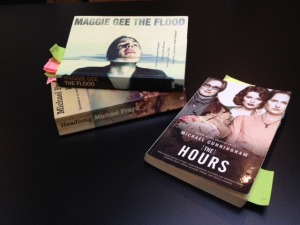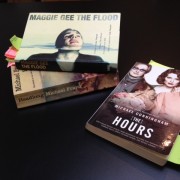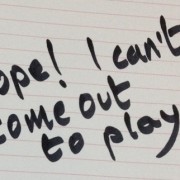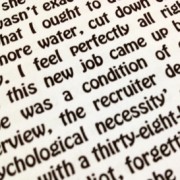More Punctuation Malarky: A Crisis of Commas
A passing remark on The Guardian Books Blog cost me dearly in woman-hours in the run up to Christmas. Blogger Alison Flood reviewed a self-published novel to test whether the online praise for the book was justified. (Mary Campisi’s A Family Affair – not my own cup of tea). I won’t present Alison’s conclusions, only her first comment:
First up, the commas. She employs the scattergun approach.
This remark prompted me to read my own novel from cover to cover. I reconsidered every blessed comma that I’d deployed in A Calculated Life. I highlighted all the commas I considered worthy of serious reconsideration.
Sad, even very sad, but true.
Before executing a purge, I paused. And I’m glad I did so.
I pulled a handful of books from my bookshelves. These included:
Maggie Gee’s The Flood
Michael Cunningham’s The Hours
Michael Frayn’s Headlong
Here’s Maggie Gee’s opening two sentences:
I am going to tell you how it happened. How I came to be here, with so many others, in this strange place I often dreamed of, or glimpsed in the distance, across the river – the lit meadows, the warm roof-tops, caught in those narrow shafts of sunlight, in this moment that lasts forever.
And her opening to Chapter 2:
Winston and Franklin, May’s grandchildren, sons of Shirley and Elroy Edwards, can’t go to nursery school today, because it is closed for teacher training.
The fourth sentence of Michael Cunningham’s prologue to The Hours:
She left a note for Leonard, and another for Vanessa.
On the third page of Frayn’s Headlong, where the main characters arrive at their weekend cottage:
There’s no sign to announce us, just a little track opening off to the left, and a certain unsurprised sensation of having arrived, that we recognise, even if visitors wouldn’t.
I can imagine an English lesson in which the teacher asks her students, in reference to the above sentences: “Which of these commas are essential and which are not?”
Maggie Gee, in particular, appears fond of the lowly comma. Many are essential – in the service of good grammar – but others serve a different purpose. And I feel these other subtle purposes would make a far more interesting English lesson.
Maybe some writers do take a scattergun approach but I wouldn’t include Gee, Cunningham and Frayn in any such category! I came to the conclusion, with regard to my own novel, that I should not, as a matter of course, obliterate all commas that failed the ‘absolutely essential’ test.
But, reader, I did delete a few.
Related blogpost:








Trackbacks & Pingbacks
[…] More Punctuation Malarky: A Crisis of Commas […]
[…] More Punctuation Malarky: A Crisis of Commas […]
Leave a Reply
Want to join the discussion?Feel free to contribute!